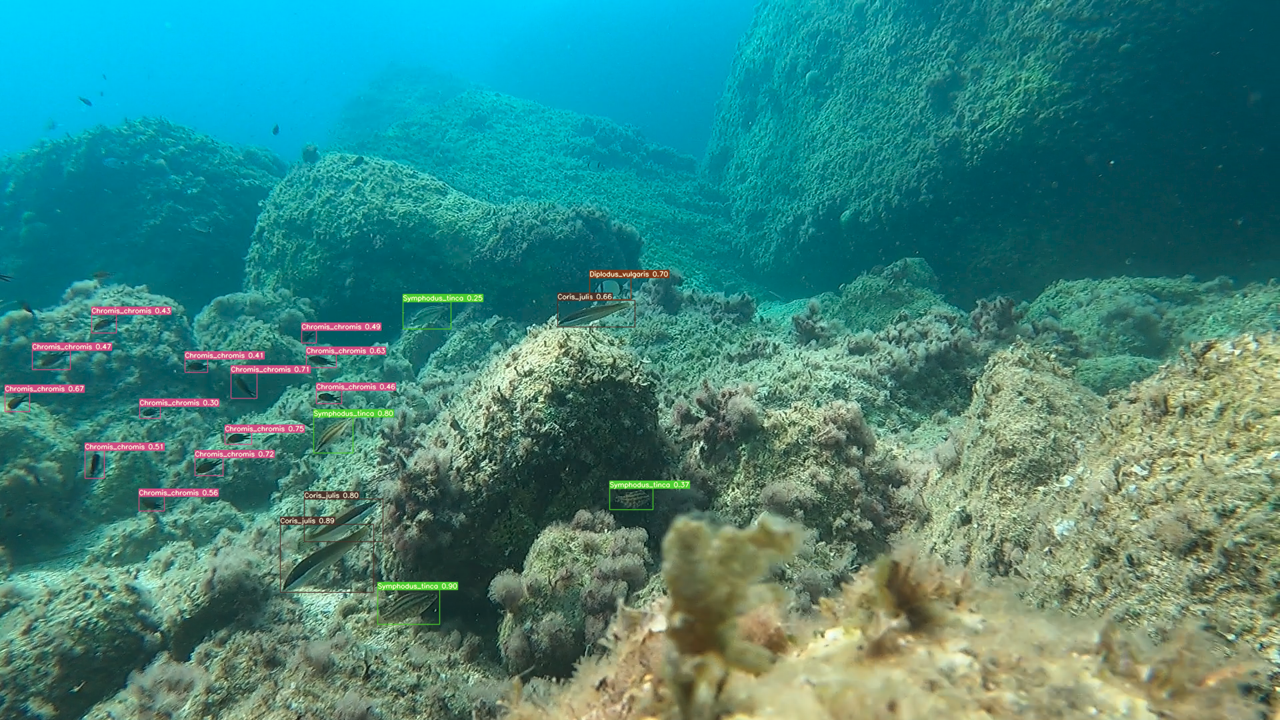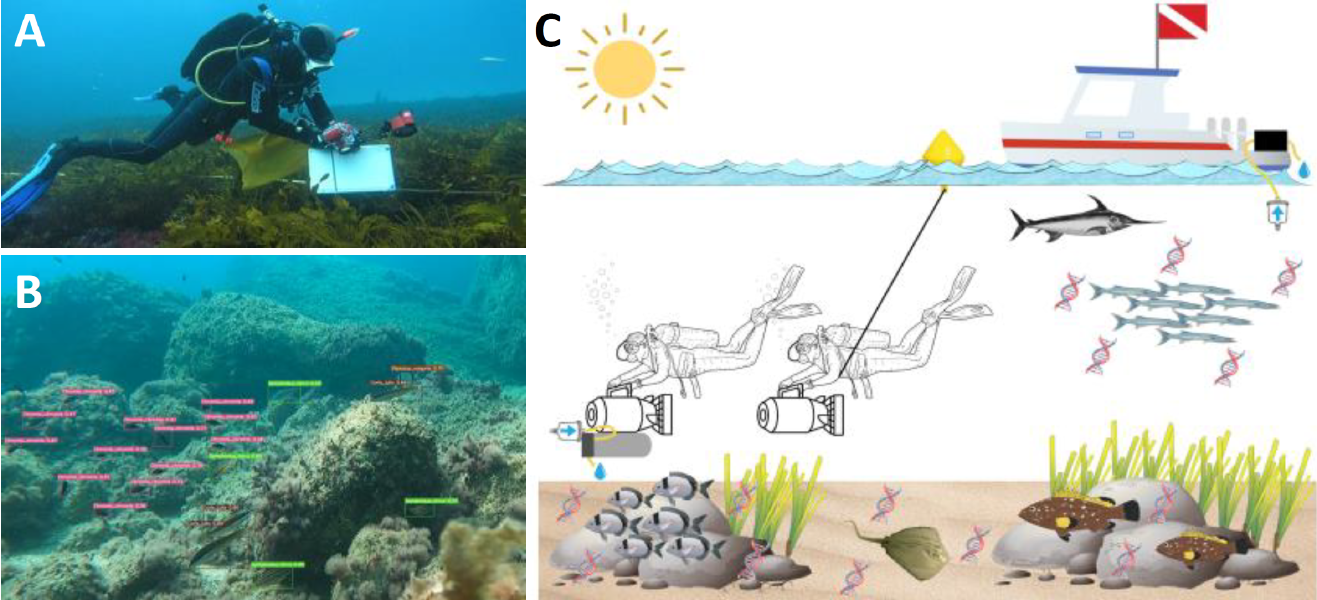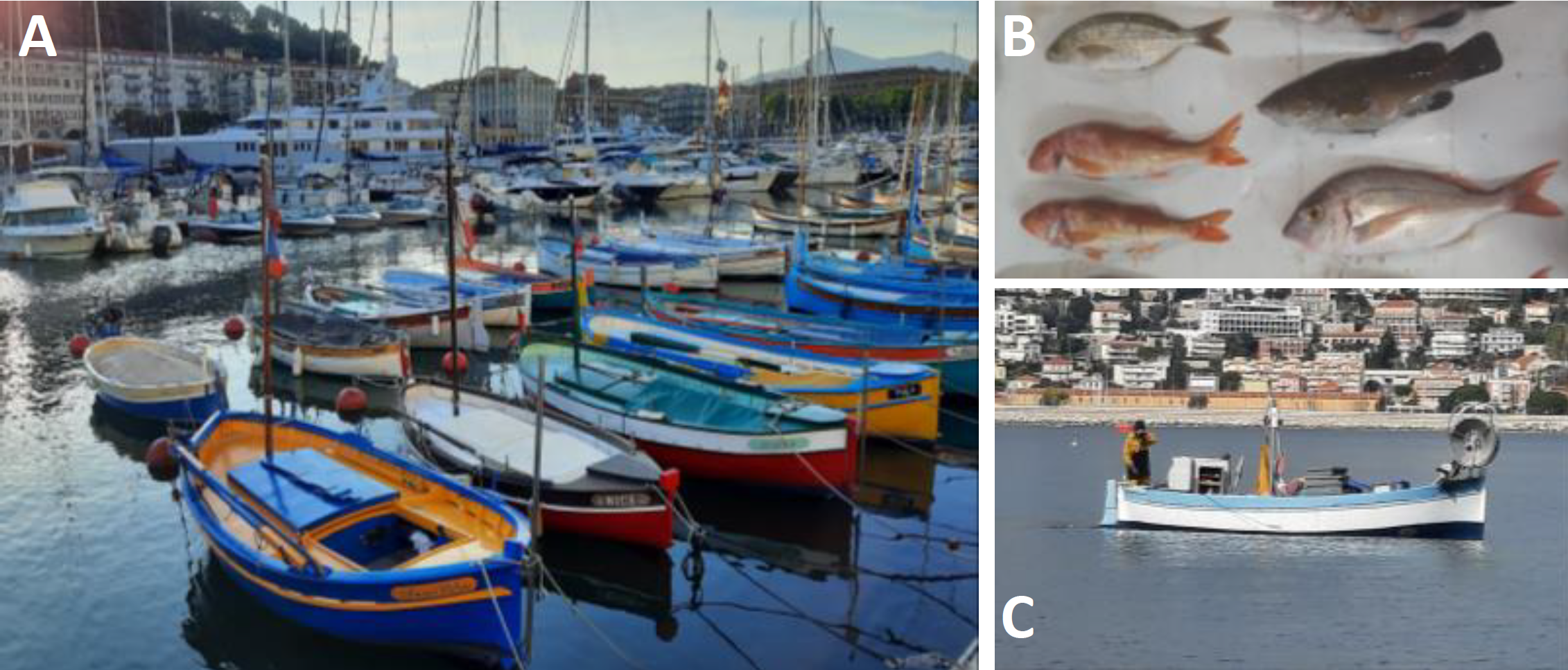Academy of Excellence "Territories, Environments, Risks and Resilience"
Integrated management of marine resources, application to the Nice Marine Protected Area
The French Riviera coastal socio-ecosystems: towards sustainable management of marine resources

Academy 3 highlight
The MARE project brings together experts from many fields to analyze the “interactions between human activities and Mediterranean marine ecosystems” on the French Riviera. It provides new monitoring tools and data on both marine biodiversity and economic activities that should help to understand how this socio-ecosystem functions, and to move towards appropriate sustainable management of human activities, in the context of a new Marine Protected Area that will be created in the Bay of Nice.
The project
The Mediterranean basin is one of the world’s biodiversity hotspots, with numerous endemic marine species. However, the Mediterranean Sea is faced with long-standing and significant anthropogenic pressures and is threatened by global climate change. It is therefore of great importance to 1) study human-environment interactions (the coastal socio-ecosystem) and 2) protect marine biodiversity through the creation of Marine Protected Areas (MPAs). MPAs are delimited maritime areas that meet the objectives of protecting/restoring marine biodiversity and promoting the sustainable management of maritime activities (fishing, sustainable recreational and tourist activities, shipping). An MPA is thus a complex system and a living lab whose creation and monitoring necessarily require an integrated transdisciplinary approach. The Nice Côte d'Azur Metropole is engaged in the creation of a new MPA in the Bay of Nice and has invited experts from Université Côte d'Azur to participate. In this context, the MARE project aims at developing new monitoring tools and knowledge for local authorities and MPA managers.
The effectiveness and benefits of MPAs and their management are usually assessed using Underwater Visual Census (UVC) techniques (scuba-diving), which are costly in terms of human resources and time. In the first task of the project, we have developed new methodologies using environmental DNA (eDNA) metabarcoding and artificial intelligence to monitor fish communities inside and outside MPAs of the Northwestern Mediterranean Sea. The eDNA protocol involves sampling both surface and bottom seawater and enables the detection of numerous fish species. Analysis of videos from UVC is performed automatically with the help of a Deep Learning (DL) algorithm. Results demonstrate the efficiency of both eDNA and DL methods for monitoring marine coastal ecosystems, providing reliable complementary tools to traditional visual methods (UVC). We also investigated whether the metabolomic footprint could reflect the health of marine organisms, especially marine forests (macroalgae). The second task of the project was dedicated to developing new sustainable food resources, and to study acceptance and behavioral changes associated with them. This was done through surveys to measure people’s willingness to modify certain eating habits, and the dual impact on both socio-economic issues and biodiversity conservation. The third task of the project focuses on developing appropriate socio-economic indicators to assess the effectiveness of the management of urban and non-urban MPAs. First, socio-economic activities within the Nice coastal area were mapped to serve as baseline before creating the MPA. Socio-economic monitoring will provide vital information on the distribution and intensity of potentially threatening activities within the MPA, as well as an evaluation of the economic costs and benefits of the MPA for different economic activities. Beside these surveys, the aim is to increase the participation and engagement of all stakeholders (commercial fishing, shipping traffic, whale-watching and recreational fishing, tourism) through constant dialogue and communication.
Overall, the outcomes of the MARE project are to facilitate the creation and improve the monitoring of urban MPAs (including Nice) and establish a management plan to promote the sustainable management of marine resources.


The +
The MARE project addresses an important challenge in the current international context, which is to develop MPAs for at least 30% of the Ocean by 2030. The forthcoming UN Ocean Conference to be held in Nice will be an extraordinary opportunity to present the newly created French Riviera MPAs.
What’s next?
The MARE project has successfully launched pilot studies (eDNA, BiodivAI) and developed new methods that could be used by the National Biodiversity Strategy of the French Biodiversity Agency (Water Framework Directive).
The project brings together scientists from different fields of expertise on the theme of coastal marine socio-ecosystems and will lead to other interdisciplinary research projects, such as new international collaborative projects with colleagues from Italy and Costa Rica.
How does the project contribute to the transdisciplinary ambition?
International and European Law - LADIE
Researchers from LADIE are providing expertise in international and European laws pertaining to the sea and maritime activities, which is a critical field for Marine Protected Areas and how they are governed.
Marine Ecology - ECOSEAS
ECOSEAS biologists are contributing to the Marine Protected Areas by working on the best available nature-based solutions.
Chemistry - ICN
The health status of marine organisms is assessed in part by mapping the molecules they produce. These molecules are identified using analytical chemistry methods, thanks to the expertise of ICN researchers.
Data mining - MAASAI-INRIA
Monitoring the health status of marine ecosystems, using techniques based on Artificial Intelligence. This is particularly the case for monitoring fish populations in Marine Protected Areas, for which a deep learning algorithm has been developed by the MAASAI team to recognize fish species.
Economics - GREDEG
In the MARE project, the GREDEG team examining behavioral change, focusing on adaptation strategies to face climate change, by combining qualitative and quantitative approaches. These methods are applied to the sustainable consumption of Mediterranean fish and to habit changes.
Tourism - ITCA
As part of the MARE project, ITCA scientists will be analyzing tourism and leisure uses of the French Riviera using questionnaires and big data technics.
Project information
|
Scientific domain
Environmental Sciences Marine ecology |
Key words Socio-ecosystems Marine Protected Areas Sustainable Management Marine Resources |
|
Total budget
€438,000, including €88,000 from Academy 3
Start of the project 2022 |
Students involved
Sylvain Roblet (PhD), Julie Marty-Gastaldi (PhD), Kilian Bürgi (PhD), José Luis Fournier Rodriguez (PhD), Erwin Reymondet (M1), Maya Bauer (M1, M2) Anaïs Montel (M1) Elise Peytoureaud (M2) |
| Partners ECOSEAS - Université Côte d’Azur, CNRS GREDEG - Université Côte d’Azur, CNRS ICN - Université Côte d’Azur, CNRS I3S - Université Côte d’Azur, CNRS, Inria LJAD - Université Côte d’Azur, CNRS LADIE - Université Côte d’Azur ITCA - Université Côte d’Azur UNA - Costa Rica COIBA AIP UniGe - Italie |
Project members Benoit Derijard Luisa Mangialajo Mohamed Mehiri Nicolas Papaïconomou Charles Bouveyron Frédéric Precioso Diane Lingrand Nathalie Lazaric Magali Lehardy Anaïs Lagelle Jean-Christophe Martin Jean-Christophe Gay Vincent Tricard |
Scientific promotion of the project
Publications:
- Monserrat, M., Comeau, S., Verdura, J. et al. Climate change and species facilitation affect the recruitment of macroalgal marine forests. Sci Rep 12, 18103 (2022). https://doi.org/10.1038/s41598-022-22845-2
- Roblet, S., Priouzeau, F., Gambini, G., Dérijard, B., and Sabourault, C. Primer set evaluation and sampling method assessment for the monitoring of fish communities in the North-western part of the Mediterranean Sea through eDNA metabarcoding. Environmental DNA (2024) https://doi.org/10.1002/edn3.554
Conferences:
- Roblet, S., Priouzeau, F., Gambini, G., Sabourault, C., and Derijard, B. Contribution of bottom sampling for improved detection of marine fishes in coastal areas through metabarcoding. The 7th European Conference on Scientific Diving (best poster award), May 14-18, 2023, Roscoff, France.
- Roblet, S., Priouzeau, F., Gambini, G., Marty, J., Cottalorda, J.M., Ben Lamine, E., Raybaud, V., Sabourault, C., and Derijard, B. Comparison of Environmental DNA metabarcoding and Underwater Visual Census for the monitoring of taxonomic and functional dimensions of fish diversity (oral presentation). International Society for Fish Biology 2024 Annual Symposium: Advancing fish ecology, management and forecasting through omics, July 15-19, 2024, Bilbao, Spain.
- SophIA Summit
- Science and society outreach events
- Soirée Patrimoine Naturel Sous-Marin de Nice au CUM (October 4, 2023).
- Nuits européennes des chercheurs (each year),
- Fête des Sciences (each year)

















